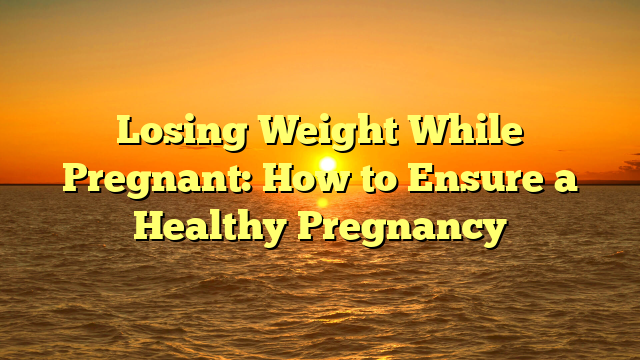Losing Weight While Pregnant: How to Ensure a Healthy Pregnancy
Losing Weight While Pregnant: How to Ensure a Healthy Pregnancy
Pregnancy is a beautiful experience filled with some challenges. Among these challenges is managing weight gain during the pregnancy phase. While it’s completely normal and important to gain weight for a healthy baby, excessive weight gain can lead to health complications for both the mother and child. Some might consider losing weight while pregnant as counterintuitive or even dangerous. However, in this blog post, we will explore safe ways to manage your weight throughout your pregnancy journey while still maintaining your fitness goals. So sit back, relax with a cup of tea (or decaf coffee!), and let’s delve into it!
Understanding Weight Gain in Pregnancy

During pregnancy, women experience a beautiful and transformative time that can also be challenging. One significant challenge is understanding weight gain. It’s crucial to remember that gaining weight during pregnancy is natural and vital for the health of both mother and baby.
During the initial three months of pregnancy, women usually gain only 1-5 pounds on account of hormonal changes and increased blood volume. Nonetheless, during the second and third trimesters, weight gain speeds up as the baby develops. On an average basis, expecting mothers are advised to put on 25-35 pounds in total during their entire pregnancy span.
Depending on various factors, such as pre-pregnancy BMI (Body Mass Index), overall health condition, diet, and exercise routine, weight gain during pregnancy can vary. While some additional weight is natural and expected during this time, excessive weight gain can lead to childbirth or postpartum complications.
It is crucial for pregnant women to consult their healthcare provider before trying any new diets or workout routines. Maintaining healthy eating habits by including lean proteins, such as fish and meats, with veggies and fruits in your daily meals can be beneficial. It’s also important to stay active through safe exercises like walking or prenatal yoga.
Planning for a healthier lifestyle change during pregnancy is crucial. To ensure safer outcomes for both mother and child, it’s important to understand the appropriate weight gain according to your body type. By doing so early on, you’ll have ample time to make adjustments towards achieving a healthy weight.
Misconceptions about Pregnancy and Weight Loss

During pregnancy, some women assume that losing weight is not recommended. However, although gaining weight is a natural and crucial aspect of having a healthy baby; excessive weight gain could result in gestational diabetes, hypertension or pre-eclampsia.
Some people think that dieting or eating less while pregnant could be harmful to the baby. However, if a healthcare expert provides guidance, expectant moms can safely manage their weight by adopting healthy eating habits and doing low-intensity exercises.
It’s also important to note that not all women will experience the same level of weight gain during pregnancy. Factors such as pre-pregnancy weight and overall health play a role in how much weight a woman may need to gain for a healthy pregnancy.
Many individuals hold the belief that shedding postpartum weight is a quick and effortless process. However, the reality is quite different. Losing those extra pounds gained during pregnancy often requires time and dedication. Rather than resorting to extreme diets or intense exercise regimes, it’s essential to focus on sustainable lifestyle changes for long-term results.
Expectant mothers can confidently and safely navigate their health journey by understanding common misconceptions about pregnancy and weight loss.
Safe Methods for Managing Weight While Pregnant

During pregnancy, weight gain can occur alongside joy and excitement. However, managing weight is crucial for a healthy pregnancy. This article offers safe methods to manage weight during this period.
A balanced diet is crucial, especially during pregnancy. To get the required vitamins without consuming extra calories, incorporating nutrient-dense foods like fruits and vegetables can prove to be extremely useful.
Moderate exercise during pregnancy can help manage weight. It is important to consult with a doctor before beginning any workout routine to ensure the safety of both the mother and baby.
Processed foods high in sugar or unhealthy fats contain unnecessary calories that can be easily avoided by replacing them with healthier snacks. By consuming nuts or yogurt instead, individuals can significantly reduce their calorie intake without sacrificing flavor and nutrition.
Throughout the day, staying hydrated can decrease cravings and hunger pangs, reducing the chances of unnecessary snacking.
Managing weight during pregnancy should avoid trendy diets and extreme measures. Instead, safe methods such as proper nutrition and regular physical activity can help ensure a healthy pregnancy and promote postpartum wellbeing.
Tips for Postpartum Weight Loss

After delivering a child, numerous mothers are keen to shed the additional pounds they gained during pregnancy. Despite this desire, it’s crucial to approach postpartum weight loss in a secure and healthy manner. To achieve your goals safely and healthily, here are some tips:
One should be patient with oneself after undergoing immense physical changes, such as those experienced during pregnancy or injury recovery. It is important to allow the body time to heal before jumping right into exercise or dieting that may prove too intense and harmful.
To maintain both mother and child’s health, it is better to focus on consuming food that contains high-quality nutrients rather than calorie restriction. This will allow you to have enough energy for the physical demands of pregnancy while providing nourishment.
It is advisable to incorporate light exercises in your daily routine once you get a clearance from your doctor. Walking and gentle yoga are good options to start with. Later, gradually increase the intensity of your exercises over time.
To stay motivated and accountable, new mothers should seek support from loved ones or join a group of other moms. This can provide the necessary encouragement and sense of community during this time.
To take care of oneself while caring for a newborn, it’s crucial to prioritize self-care. This means getting enough rest and taking breaks whenever necessary. It’s important to remember that nurturing your own well-being is just as vital as tending to your little one.
Following these tips and being kind to oneself can lead to sustainable postpartum weight loss and prioritize overall health and wellbeing.
Conclusion
As this article on managing weight during pregnancy draws to a close, it’s crucial to bear in mind that each pregnancy experience is unique and has distinguishable characteristics. There are no predefined solutions to fit every situation. Nevertheless, with the right attitude and appropriate measures, one can safely manage their weight throughout the term of pregnancy.
During pregnancy, it’s crucial to maintain a healthy weight by gradually modifying your dietary habits and physical activity routine. Avoiding extreme diets or workouts is key; instead, strive for a manageable lifestyle that best suits both you and your child.
It’s important to keep in mind that losing weight after childbirth is a gradual process that requires patience and time. You should let your body recover from pregnancy before starting any intensive exercise or diet plans. Rather than solely focusing on shedding pounds quickly, concentrate on establishing healthy habits for yourself and your loved ones.
For pregnant women who wish to shed some pounds, seeking the counsel of a healthcare professional to adopt safe weight management strategies is important. Always prioritize a healthy pregnancy for both you and your newborn.
FAQ’s
Q: Can I diet while pregnant?
During pregnancy, it is not advisable to start a weight loss diet. However, one can still ensure a healthy dietary routine by making conscious food choices and maintaining balance in their meals.
Q: How much weight should I gain during pregnancy?
The weight that a woman should gain during pregnancy is dependent on their pre-pregnancy BMI. For women with a normal BMI, health experts recommend gaining around 25-35 pounds. For those carrying extra weight or classified as obese based on their BMI, they may need to gain less.
Q: When can I start exercising after giving birth?
It is recommended to wait until the postpartum checkup to receive clearance from a physician. For vaginal births, this typically occurs around six weeks after delivery while those who underwent C-sections should typically wait for 8 weeks.
The health of the mother and baby are crucial during pregnancy. While shedding extra weight may not be the primary aim, adopting a healthy lifestyle that includes nutritious meals and moderate exercise can benefit both the mom-to-be and her little one in several ways. Before making substantial changes to their diet or workout routine during pregnancy, it is always important for women to consult with their healthcare providers.







